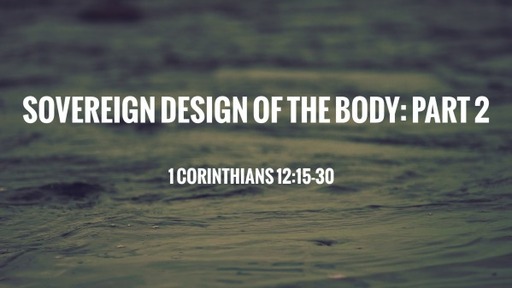Sovereign Design of the Body: Part 2

1. Joined by one Spirit (12-14)
2. Composed with diverse purpose (15-27)
A. Feeling of inadequacy (vs 15-16)
B. Confirming logic (vs 17, 19)
He sets aside a foolish aiming at equality, by showing the impossibility of it. “If all the members,” says he, “desire the honour that belongs to the eye, the consequence will be, that the whole body will perish; for it is impossible that the body should remain safe and sound, if the members have not different functions, and a mutual correspondence between them. Hence equality interferes with the welfare of the body, because it produces a confusion that entails present ruin. What madness, then, would it be, should one member, instead of giving way to another,2 conspire for its own ruin and that of the body
C. Confirming the promise of God’s sovereign plan (vs 18,24,28)
When we refuse to follow God’s will and God’s plan we deny His authority and Lordship as well as His wisdom and goodness. As members of Christ’s Body we are not to do our own will but the Lord’s. The arm does not have one will, the foot another, and the eye still another. Each is controlled by the head—the mind, will, and spirit. It is possible for the body to be so remarkably coordinated only because it is directed by one will. One will tells each part of the body to do what it is best designed and equipped to do, and consequently they work in marvelous harmony together. How much more should the Lord Jesus Christ control His own Body, the church, of which He not only is Head but Creator
D. Attitude of superiority (vs 20-21)
E. Confirming promise that those weaker will receive honor (vs 22-24)
F. Confirming promise that the unity of the body leads to purposeful care of one another (vs 25-27)
“Run unto him, and reaching out your hand, raise him up again, comfort him with sweet words, and embrace him with motherly arms.”121
